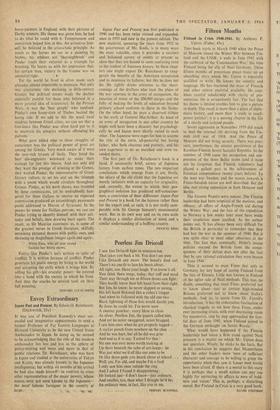Envoy Extraordinary
Japan Past and Present. By Edwin 0. Reischauer. (Duckworth, 21s.) IT was one of President Kennedy's most suc- cessful and imaginative appintments tb send a former Professor of Far Eastern Languages at Harvard University to be the new United States Ambassador to Japan. In doing so, he seemed to be acknowledging that the role of the modern ambassador lies less and less in the sphere of policy-making and more and more in that of public relations. Dr. Reischauer, who was born in Japan'and studied at the universities of Tokyo and Kyoto, was already known to the Japanese intelligentsia; but within six months of his arrival he had also made himself—in contrast to some other representatives of the major powers, whose names were not even known to the Japanese-- the most famous foreigner in the country at
large. -mi. Japan Past and Present was first published in 1946 and has been twice revised and expanded, once in 1953 and now in the present edition. The new material, spanning the years from 1952 to the government of Mr. Ikeda, is in many ways the most valuable, since it provides a succinct and balanced survey of events at present so close that they are bound to seem confusing even to the student of Japanese history. In these chap- ters one might expect Dr. Reischauer to exag- gerate the benefits of the American occupation and to minimise its failures; but this he does not do. He rightly draws attention to the short- comings of the draftees who took the place of the war veterans in the army of occupation, the injustice of many of the 200,000 purges and the folly of making the levels of education beyond primary school conform to those in the States. On the other hand, he pays a deserved tribute to the work of General MacArthur. As head of an army of occupation in any other country he might well have been a disaster; but psychologi- cally he and Japan were ideally suited to each other. The Japanese were eager for him to assume the role of the stern, all-powerful but loving father, who both chastens and protects; and his own eagerness to do so matched and even ex- ceeded theirs.
The first part of Dr. Reischauer's book is a lucid, if necessarily brief, survey of Japanese history from earliest times. The two important conclusions which emerge from it are, firstly, the idiocy of the old clichd that the Japanese are merely imitators with no capacity for originality, and, secondly, the extent to which their geo- graphical isolation has produced self-conscious- ness, a conviction of their difference. Japan Past and Present is a book for the layman rather than for the expert and, as such, it is not really com- parable with Sir George Sansom's monumental work. But in its own way and on its own scale it displays a similar distinction of mind and a similar understanding of a baffling country.
FRANCIS KANO






























 Previous page
Previous page